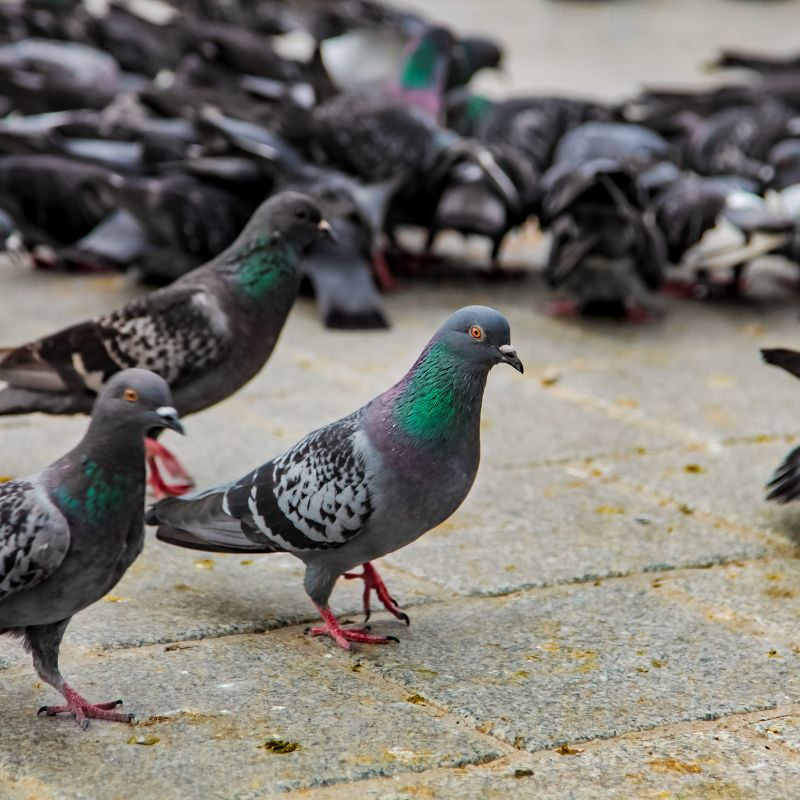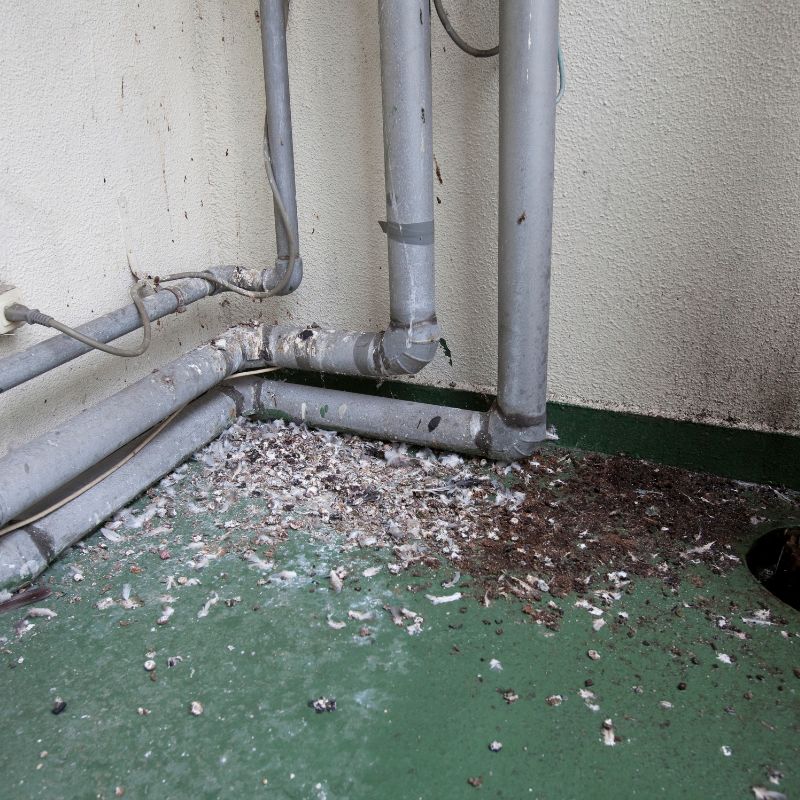Pigeon Droppings Clean-Up Service
CICS provides a comprehensive pigeon droppings and bird waste removal service throughout the UK, catering to businesses and local councils alike. As skilled biohazard cleaning professionals, we excel at eliminating acidic pigeon droppings through the use of secure, non-abrasive techniques.
- CQC Compliant Service
- Utilising Medical Grade ATP Testing and ULV Fogging
- Adhering to ISO Standards for Quality Care and Professionalism
- Affordable Rates with Swift & Straightforward Quotes
- Proudly Holding GBAC Star Accreditation
Pigeon Droppings Sanitisation
Our pigeon droppings sanitisation service guarantees a comprehensive and hygienic cleaning of areas affected by pigeon waste. By employing advanced techniques and equipment, we effectively eliminate health risks and restore the affected surfaces to a safe and clean state.
Pigeon guano in particular not only creates an unpleasant sensory experience, but it also poses health hazards to humans, animals, and the environment. Hantavirus and psittacosis are among the diseases carried by pigeon faeces, which can be transmitted through direct contact with the virus.
CICS offers a reliable and secure cleaning and removal service. As expert biohazard cleaners, we completely remove acidic pigeon droppings using safe, non-abrasive methods. Our services extend nationwide, with key locations in London, Bristol, Bath, Cardiff, and Newport.
Our skilled specialists utilise powerful, industry-leading technologies to clean stone structures, buildings, balconies, equipment, and ventilation systems. Our exceptional service removes bird droppings, ensuring a 100% clean and safe workplace. To prevent the spread of diseases, our standard cleaning service includes full ISO 14001 and GBAC certified disinfection and decontamination. We cater to a variety of clients, such as:
- Businesses
- Local Government
- Factories
- Educational Facilities
- Public Transport


Why is Pigeon Dropping Cleanup Essential?
Pigeon droppings are not merely an aesthetic concern; they also present significant health, environmental, legal, and financial challenges if left to accumulate or untreated.
Health Hazards – Pigeon droppings contain harmful microorganisms such as bacteria, viruses, and parasites, posing a significant threat to vulnerable populations.
Structural Deterioration – Pigeon droppings don’t only affect humans; they also damage buildings. The acidic nature of guano gradually erodes and stains surfaces, with limestone structures being particularly susceptible.
Slip and Fall Risks – Pigeon faeces and bird guano create slippery walking surfaces, making businesses and local governments potentially liable for damages and injuries.
Drainage Issues and Flooding – Pigeon droppings and nesting materials can obstruct gutters and downpipes, leading to flooding within buildings.
Damage to Reputation – Pigeon droppings are unsightly, and if you find them unpleasant, it’s likely your customers do too. For companies with a public-facing presence, regular cleanup of droppings is crucial for maintaining an appealing appearance.
How Dangerous is Pigeon Gauno?
Pigeon droppings, although seemingly harmless, pose potential health risks to humans. When dust or water droplets contaminated with bird feces are inhaled, they can transmit several diseases, including a flu-like illness called psittacosis. Moreover, some bird droppings may contain Salmonella, a bacterial infection that can cause diarrhoea and other gastrointestinal issues.
To minimise the risk of contracting these diseases, it is essential to take precautions when handling or coming into contact with pigeon droppings. For example, individuals should thoroughly wash their hands and cleanse any exposed skin before consuming food, drinking, or touching their mouths. The same hygiene practices should be followed after feeding or handling birds.
People with compromised immune systems, such as those with HIV/AIDS or cancer, are at higher risk for contracting diseases from pigeon droppings and should avoid cleaning them up. In general, it is crucial to be aware of the potential dangers associated with pigeon droppings and adopt appropriate safety measures to protect one’s health.


What do Pigeons Eat?
With around 340 species of pigeons worldwide, many of which are native to the Asian Pacific region, it is challenging to make generalisations about their diets. Some well-known species, like the common wood pigeon, rock pigeon, and mourning dove, are often found in close proximity to human cities and towns. The vast and diverse nature of pigeon species makes it difficult to pinpoint any precise details about their diets as a whole.
Pigeons are sometimes considered true omnivores, as they consume both plant-based and animal-based food sources. However, the majority of their diet consists of plant materials such as grains, grasses, leafy greens, herbs, weeds, fruits, and berries. They do supplement their diet with earthworms, snails, and insects on occasion.
The habitat and location of pigeons play a significant role in determining their diet. For instance, pigeons living near the tropics tend to forage on trees due to the higher nutrient content found in fruits compared to seeds.
In contrast, temperate species primarily rely on seeds for nourishment. The common mourning dove, for example, has a diet that consists of around 99% seeds, including cultivated grains and peanuts.
It is estimated that pigeons consume between 12% and 20% of their body weight daily, averaging around 71 calories. This highlights the remarkable adaptability of pigeons, as they can adjust their diets depending on the available resources in their surroundings.
With around 340 species of pigeons worldwide, many of which are native to the Asian Pacific region, it is challenging to make generalisations about their diets. Some well-known species, like the common wood pigeon, rock pigeon, and mourning dove, are often found in close proximity to human cities and towns. The vast and diverse nature of pigeon species makes it difficult to pinpoint any precise details about their diets as a whole.
Pigeons are sometimes considered true omnivores, as they consume both plant-based and animal-based food sources. However, the majority of their diet consists of plant materials such as grains, grasses, leafy greens, herbs, weeds, fruits, and berries. They do supplement their diet with earthworms, snails, and insects on occasion.
The habitat and location of pigeons play a significant role in determining their diet. For instance, pigeons living near the tropics tend to forage on trees due to the higher nutrient content found in fruits compared to seeds.
In contrast, temperate species primarily rely on seeds for nourishment. The common mourning dove, for example, has a diet that consists of around 99% seeds, including cultivated grains and peanuts.
It is estimated that pigeons consume between 12% and 20% of their body weight daily, averaging around 71 calories. This highlights the remarkable adaptability of pigeons, as they can adjust their diets depending on the available resources in their surroundings.
Our Cleanup Services in London
CICS Cleaning provides expert bird droppings removal and pigeon guano sanitation services in several boroughs in London. In addition to supporting residents and businesses in Westminster, we offer our services to other areas, including Barking and Dagenham, Bexley, Croydon, Bromley, Chelsea, Barnet, Brent, and Camden.
We understand the value of safe and effective bird droppings and pigeon guano removal, which is why we employ gentle techniques to clean stone structures, buildings, balconies, machinery, and ventilation systems. Whether you need a one-time cleanup or ongoing maintenance, our team of specialists is equipped to meet your needs.
In addition to bird droppings removal, we also offer a range of other specialist cleaning services including biohazard cleanups and antiviral and disinfection services. With our expertise in sanitation and hygiene, we can help you maintain a clean and safe environment for your brewery operations.














